I am using several std::map type data containers which are the following:
std::map<int, std::vector< cv::Point > > mapGoodContours;
std::map<int, EllipseProperties> ellipsePropertiesMap;
std::map<int, float> m_markerRadiusMap;
std::map<int,cv::Point2f> markers;//This is part of another class
I iterate through these containers and erase some elements after those elements meet certain condition as shown in the following code.
auto radiusMapCounter = m_markerRadiusMap.begin();
auto markerCounter = frames.markers.begin();
auto goodContoursCounter = mapGoodContours.begin();
if(m_markerRadiusMap.size()==ellipsePropertiesMap.size() && frames.markers.size()==ellipsePropertiesMap.size()
&& mapGoodContours.size()==ellipsePropertiesMap.size())
{
for(auto ellipsePropertyCounter = ellipsePropertiesMap.begin(); ellipsePropertyCounter != ellipsePropertiesMap.end(); ellipsePropertyCounter++)
{
float upperLimit = (float)m_upperFactor*(float)ellipsePropertyCounter->second.radius;
float lowerLimit = (float)m_lowerFactor*(float)ellipsePropertyCounter->second.radius;
if(ellipsePropertyCounter->second.minDistanceFromOtherEllipse>upperLimit
|| ellipsePropertyCounter->second.minDistanceFromOtherEllipse<lowerLimit)
{
ellipsePropertiesMap.erase(ellipsePropertyCounter);
m_markerRadiusMap.erase(radiusMapCounter);
frames.markers.erase(markerCounter);
mapGoodContours.erase(goodContoursCounter);
}
else
{
smallContours.push_back(goodContoursCounter->second);
}
radiusMapCounter++;
markerCounter++;
goodContoursCounter++;
}
}
I am baffled to find that sometimes I have segmentation faults as shown in the image.  The fault specifically points to the line with the code
The fault specifically points to the line with the code radiusMapCounter++;
What am I doing wrong?